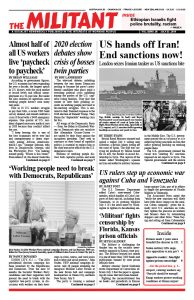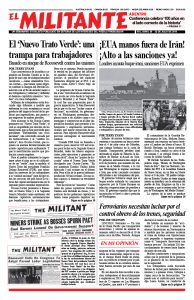July 25, 1994
The massive gay rights demonstration in New York June 26 struck a blow against the right-wing assault on gay rights. It was a boost for the working class and all defenders of civil liberties and democratic rights.
Attacks on the civil rights of homosexuals, and laws such as the Pentagon’s ban on gays in the military, cut away at the democratic rights that workers have fought for and need today to defend their interests. Its aim is to make it harder for working people to unite across such barriers as race, sex, and national origin to wage an effective fight against the capitalists and the disaster their system has in store for humanity.
The demonstration on the 25th anniversary of the Stonewall rebellion was a powerful answer to this offensive. The organizers set an important tone of civility — welcoming anyone who opposed discrimination against gays.
July 25, 1969
The action taken by the Seattle antiwar movement welcoming home the first contingent of GIs withdrawn from Vietnam, and exposing the hoax that the so-called “withdrawal” represents, sets an example for the entire antiwar movement in the United States.
Nixon hopes to swindle opponents of the war into believing that he is vigorously pursuing all opportunities for ending the war. Nothing could be more dangerous than to accept such a myth. American men and Vietnamese men, women and children continue to die every day, every hour, every minute as the U.S. policy of maximum military pressure on the “enemy” is maintained. The only thing Nixon is “vigorously pursuing” is more freedom from pressure created by the antiwar sentiment in the U.S.
It is crucial that mass actions continue to demand that all the men be brought home, not just a few thousands.
July 22, 1944
GRAND RAPIDS, Mich. — 1,800 delegates, representing more than 800,000 Michigan CIO workers met here for their seventh annual state convention. This gathering was marked by a rank and file revolt against the no-strike pledge foisted on the membership by the top CIO officialdom. Forming their own caucus with but little preparation, the ranks waged a strong uphill battle against the bureaucrats and succeeded in mustering more than a third of the delegates to rise in favor of rescinding the no-strike pledge.
A score of leading UAW and CIO officials warned against the consequences that would befall the workers if the no-strike policy were altered. The war would be lost, Roosevelt would be defeated, and public opinion would be inflamed against the working class. Yet the ranks not only fought back but forged a leadership in the very heat of battle.

